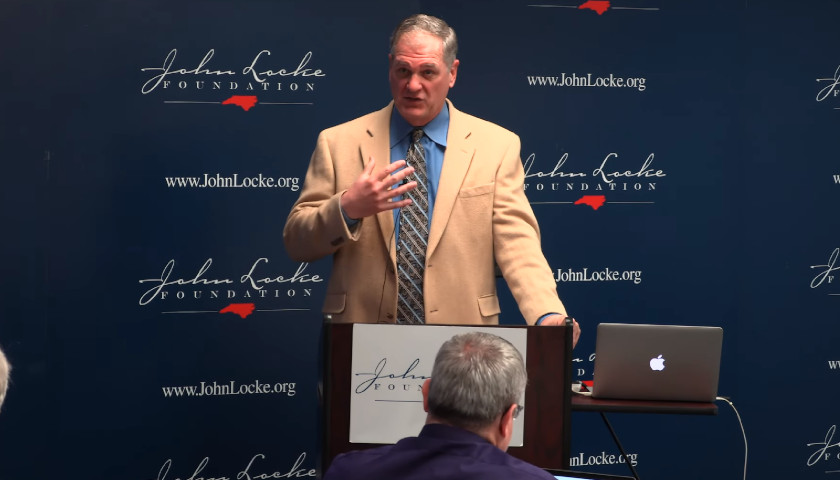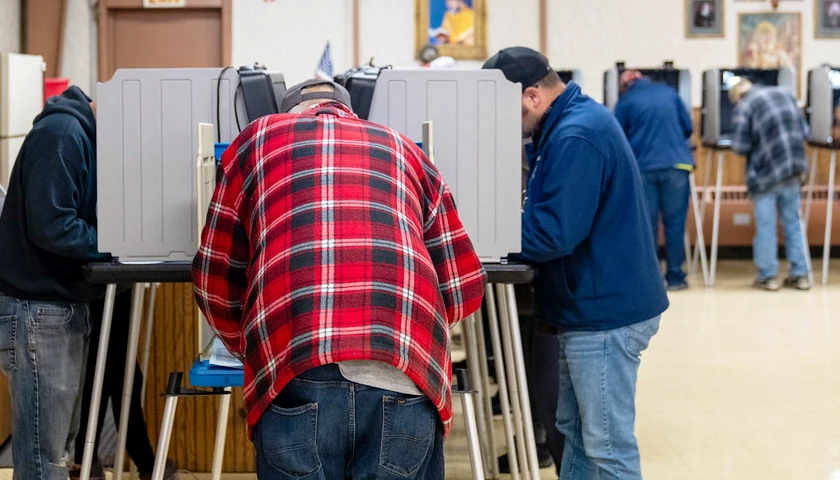“School choice is the civil rights movement of our time,” Mike Long, the President of Parents for Educational Freedom in North Carolina (PEFNC) told the attendees of a School Choice event in North Carolina this week.
Long was speaking to a group at an event held by the John Locke Foundation, a conservative non-profit policy center located in Raleigh.
Dr. Terry Stoops, Vice President for Research and Director of Education Studies at the John Locke Foundation kicked off the event.
“It is fitting that the first day of National School Choice week falls on Martin Luther King day,” said Dr. Stoops.
Stoops went on to cite a quote about school choice from Alveda King, the niece of Dr. Martin Luther King, Jr.:
“Is it moral to tax families, compel their children’s attendance at schools and then give them no choice between teaching methods, religious or secular education, and in other matters?
“Is it consistent to proclaim that meanwhile, America is a nation that prides itself on competition, consumer choice, freedom of religion, and parental responsibility?
I can’t presume to know what my uncle would say about the current debate over school vouchers and choice, but I know what principles he taught and I know that he not only preached but also practiced them.
Martin Luther King, Jr. and his siblings were products of private and public education. In turn, they educated their children in both public and private schools and impressed upon my generation the importance of faith and family in effective schooling. The issue is not what families choose, but rather that they be allowed and empowered to do so.”
Dr. Stoops then introduced Mike Long, the new President of PEFNC.
Long has been involved in education for 35 years and is a former middle school teacher, an AP US History teacher, a high school principal and was the Head of School at the Carmel Christian School in Charlotte, North Carolina.
In addition to his teaching and school administrative experience, Long was also a key figure in the development of legislation in North Carolina for combating teen pregnancy through abstinence.
Long spoke a bit about PEFNC as a non-profit that promotes “quality educational options through parental school choice.” He also stressed that choice includes traditional public schools.
School choice in North Carolina for the 2017-18 school year includes over 1.4 million public school students, 135,798 homeschoolers, 101,775 private school students, and 100,986 public charter school students.
Long’s presentation highlighted that over the last three years, parents in North Carolina had been shifting away from traditional public schools.
2015 and 2018, public district schools in the state saw a drop in enrollment by 1.18% or 23,606 students.
Conversely, public charter schools gained 23,195 students (+30%), homeschools rose by 17,481 students (+15%), and private schools increased by 4,045 students (+4%).
We have to ask, ‘why is that happening?'” Long said.
“I want to share with you a video,” said Long. ” that helps explain the reason why.
The video is the story of how North Carolina’s school choice option radically helped the Bradford family, whose daughter Libby has special needs.
North Carolina’s Special Needs Education Savings Account (ESA) program and the state’s disabilities grant made a dramatic difference for Libby both academically and emotionally.
At the conclusion of the clip, Long remarked that what struck him about what the principal in the video has said is that ‘yes we met the needs of this little girl, but this girl made the difference in our student population and the other kids that are there’.
Long went on to talk about the number one thing parents look for in a school is safety and how schools deal with bullying.
Long described the results of a recent parent survey of around 1,500 parents PEFNC had worked with who had been a part of the North Carolina Opportunity Scholarship Program (OSP).
The OSP is a scholarship program that pays $8,000 a year towards the tuition of the private school chosen by a recipient family. The OSP is for low-income families and certain income thresholds and other criteria must be met in order to qualify. In 2018, over 7,500 students in North Carolina took advantage of the OSP.
97% of parents who took the PEFNC survey were ‘satisified’ or ‘greatly satisfied’ with the school of their choice and 99% said they felt ‘safe’ in the new school of their choice.
North Carolina’s Democratic Governor has consistently taken anti-school choice positions. In one of the many lawsuits Cooper filed against the General Assembly he snuck in a provision that tried to block OSP funding, claiming it violated the state constitution.
In response to Governor Cooper’s action, PEFNC filed an Amicus Brief and an affidavit filed by the former PEFNC President, Darrell Allison. Cooper’s attempt failed with the court ruling that the program’s funding was constitutional.
Another area Long covered was the economic benefits of school choice.
Studies have shown that families are willing to travel large distances to attend a particular school or have often moved just to be in close proximity to a school they want their child to attend.
That movement has ripple effects, whereby business and industry also benefit from being in proximity to schools that families find desirable.
Watch PEFNC’s President Mike Long’s full remarks:
– – –
A.P. Dillon is the North Carolina Bureau Chief for The Tennesee Star and a reporter at Battleground State News. Follow A.P. Dillon on Twitter. Email Tips to [email protected].
Photo “Mike Long” by John Locke Foundation.






[…] Earlier in the week, Mike Long, the President of Parents for Educational Freedom in North Carolina (PEFNC) told the attendees of a School Choice event that “School choice is the civil rights movement of our time.” […]
[…] Earlier in the week, Mike Long, the President of Parents for Educational Freedom in North Carolina (PEFNC) told the attendees of a School Choice event that “School choice is the civil rights movement of our time.” […]